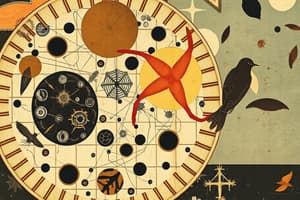Podcast
Questions and Answers
Which statement accurately reflects a tenant of cell theory?
Which statement accurately reflects a tenant of cell theory?
- Cells are only found in multicellular organisms.
- All cells have the ability to spontaneously generate.
- Living organisms can arise from non-living matter.
- All living organisms are made up of cells. (correct)
What significant contribution did Robert Hooke make to the study of cells?
What significant contribution did Robert Hooke make to the study of cells?
- He was the first to view and describe cells. (correct)
- He proposed the idea of spontaneous generation.
- He formulated the cell theory in 1839.
- He discovered the structure of DNA.
Which of the following best describes unicellular organisms?
Which of the following best describes unicellular organisms?
- They are always larger than multicellular organisms.
- They consist of a single cell that performs all life functions independently. (correct)
- They rely on other cells for performing life functions.
- They are composed of multiple types of cells.
What is the primary function of DNA within a cell?
What is the primary function of DNA within a cell?
Which process describes how identical cells are created in multicellular organisms?
Which process describes how identical cells are created in multicellular organisms?
Which feature is characteristic of all cells?
Which feature is characteristic of all cells?
Which statement is true regarding multicellular organisms?
Which statement is true regarding multicellular organisms?
Why is the cell theory considered fundamental in biology?
Why is the cell theory considered fundamental in biology?
Flashcards
Cell Theory
Cell Theory
The theory that explains how living organisms are made up of cells and how life functions.
Spontaneous Generation
Spontaneous Generation
The outdated theory that living organisms could arise from non-living matter, like maggots from rotting meat.
Robert Hooke
Robert Hooke
The first person to observe and describe cells, using a microscope to look at a slice of cork.
Unicellular Organisms
Unicellular Organisms
Signup and view all the flashcards
Multicellular Organisms
Multicellular Organisms
Signup and view all the flashcards
Mitosis
Mitosis
Signup and view all the flashcards
Cell Membrane
Cell Membrane
Signup and view all the flashcards
Cytosol
Cytosol
Signup and view all the flashcards
Study Notes
Cell Theory
- Cell theory is the accepted scientific explanation for how most life on Earth functions; it refutes spontaneous generation.
- Spontaneous generation is an outdated theory proposing living organisms can arise from non-living matter.
- Robert Hooke first observed and described cells in 1665 while examining cork.
- He named them "cells" due to their resemblance to small compartments.
- Living organisms can be either unicellular (e.g., amoeba) or multicellular (e.g., plants, animals, humans).
- Cells are the fundamental building blocks of life.
- Cell theory, formulated in 1839, is primarily attributed to Matthias Schleiden, Theodor Schwann, and Rudolph Virchow.
- Cell theory tenets include:
- All living organisms are composed of cells.
- Cells are the fundamental structural and organizational units of living organisms.
- All cells arise from pre-existing cells.
Components of a cell
- Cells have a semi-permeable membrane, composed of phospholipids.
- The membrane encloses the cytosol, a liquid containing water, salts, and other solutes.
- Organelles are suspended in the cytosol and carry out specific cell functions.
- All cells contain DNA, the genetic material, which encodes information for vital life processes (energy production, reproduction, movement, excretion, etc.).
Unicellular vs. Multicellular Organisms
- Unicellular organisms consist of a single cell that performs all life functions independently.
- Multicellular organisms are comprised of millions of cells working cooperatively.
- Mitosis is the cell division process creating identical cells in multicellular organisms.
- These identical cells differentiate into various tissues and organs based on signals they receive.
Cell Theory Tenants Explained
- All living things are composed of cells — a fundamental biological principle applicable to all, from simple to complex organisms.
- Cells are the basic structural and functional units in all living things. In multicellular organisms, cells form tissues, tissues form organs, and organs form organ systems.
- Cells only arise from other pre-existing cells. This principle explains the continuity and evolution of life.
Viruses and Cell Theory
- Scientists debate whether viruses are living organisms, as they lack certain characteristics of cells.
Summary
- Cell theory provides a foundational understanding of life's structure and origin.
- It emphasizes the cell as the fundamental unit of life and the role of cell division in growth, development, and reproduction.
Studying That Suits You
Use AI to generate personalized quizzes and flashcards to suit your learning preferences.




